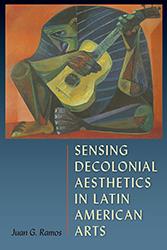Sensing Decolonial Aesthetics in Latin American Arts
Juan G. Ramos
Hardcover: $79.95
“The greatest strengths of this book lie in its extensive engagement with the concept of ‘sensing decolonial aesthetics’ and the rather rich reading of specific examples of artists seeking to redefine the relationship of the arts to popular audiences. . . . Strong analytical reach.”—Modern Language Notes
“Unlike many works that focus on a single country or region to discuss the 1960s in Latin America, Ramos embarks on a journey to discover a continental decolonial aesthetic. . . . The book’s ambitious scope, coupled with its excellent case studies, means that it will be mandatory reading for students and scholars. . . . Will leave a lasting impression on Latin American studies specifically and postcolonial studies more generally.”—The Americas
“Mediante un estudio que rompe con las divisiones . . . Ramos junta poesía, música y el cine para leer-las desde los lentes contemporáneos de la crítica a la colonialidad y del pensamiento decolonial. . . . El libro reposiciona para el presente algunos viejos debates a la vez que anima a recorrer otros caminos para continuar pensando en las continuidades de las propuestas estéticas estudiadas.”—Revista de Estudios Hispánicos
"Situates key films, poetry, popular songs, and fiction at the crossroad of Latin America's decolonial theory and Rancière's 'aisthesis.' Incisively delving into the conditions of production corresponding to the multimedia texts analyzed, this book produces a compelling discussion of 'decolonial aesthetics.'"—Sara Castro-Klarén, author of The Narrow Pass of Our Nerves: Writing, Coloniality and Post-Colonial Theory
"How is Latin American art redefined when the notion of aesthetics is decolonized? Ramos invites readers to sense otherwise by exploring the productive intersections of literary, visual, and sonic arts in the region."—Yolanda Martínez-San Miguel, author of Coloniality of Diasporas: Rethinking Intra-Colonial Migrations in a Pan-Caribbean Context
"Through the study of literary texts, songs, films, and other forms of symbolic representation, Sensing Decolonial Aesthetics in Latin American Arts constitutes an important step forward in the process of understanding and interpreting collective subjectivity and integrating reason and sensitivity, politics and art, emancipation and juissance."--Mabel Moraña, author of The Monster as War Machine
Bringing Latin American popular art out of the margins and into the center of serious scholarship, this book rethinks the cultural canon and recovers previously undervalued cultural forms as art. Juan Ramos uses "decolonial aesthetics," a theory that frees the idea of art from Eurocentric forms of expression and philosophies of the beautiful, to examine the long decade of the 1960s in Latin America--a time of cultural production that has not been studied extensively from a decolonial perspective.
Ramos looks at examples of "antipoetry," unconventional verse that challenges canonical poets and often addresses urgent social concerns. He analyzes the militant popular songs of nueva canción by musicians such as Mercedes Sosa and Violeta Parra. He discusses films that use visually shocking images and melodramatic effects to tell the stories of Latin American nations. He asserts that these different art forms should not be studied in isolation but rather brought together as a network of contributions to decolonial art. These art forms, he argues, appeal to an aesthetic that involves all the senses. Instead of being outdated byproducts of their historical moments, they continue to influence Latin American cultural production today.
Juan G. Ramos, associate professor of Spanish at the College of the Holy Cross, is coeditor of Decolonial Approaches to Latin American Literatures and Cultures.
- Sample Chapter(s):
- Table of Contents
- Excerpt
There are currently no reviews available












